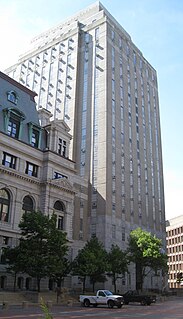
William Cushing was one of the original five associate justices of the United States Supreme Court; confirmed by the United States Senate on September 26, 1789, he served until his death. His Supreme Court tenure of 20 years and 11 months was the longest among the Court's inaugural members. In January 1796, he was nominated by President George Washington to become the Court's Chief Justice; though confirmed, he declined the appointment. He was the last judge in the United States to wear a full wig.
Nuisance is a common law tort. It means that which causes offence, annoyance, trouble or injury. A nuisance can be either public or private. A public nuisance was defined by English scholar Sir James Fitzjames Stephen as,
"an act not warranted by law, or an omission to discharge a legal duty, which act or omission obstructs or causes inconvenience or damage to the public in the exercise of rights common to all Her Majesty's subjects".
The attractive nuisance doctrine applies to the law of torts in some jurisdictions. It states that a landowner may be held liable for injuries to children trespassing on the land if the injury is caused by an object on the land that is likely to attract children. The doctrine is designed to protect children who are unable to appreciate the risk posed by the object, by imposing a liability on the landowner. The doctrine has been applied to hold landowners liable for injuries caused by abandoned cars, piles of lumber or sand, trampolines, and swimming pools. However, it can be applied to virtually anything on the property.
A covenant, in its most general sense and historical sense, is a solemn promise to engage in or refrain from a specified action. Under historical English common law, a covenant was distinguished from an ordinary contract by the presence of a seal. Because the presence of a seal indicated an unusual solemnity in the promises made in a covenant, the common law would enforce a covenant even in the absence of consideration. In United States contract law, an implied covenant of good faith is presumed.

The public trust doctrine is the principle that the sovereign holds in trust for public use some resources such as shoreline between the high and low tide lines, regardless of private property ownership.
A servitude is a qualified beneficial interest severed or fragmented from the ownership of an inferior property and attached to a superior property or to some person other than the owner. At civil law, ownership (dominium) is the only full real right whereas a servitude is a subordinate real right on par with wayleaves, real burdens, security interests, and reservations. There are two types: predial, attaching to property, and personal, attaching to a person.
Bennis v. Michigan, 516 U.S. 442 (1996), was a decision by the United States Supreme Court, which held that the innocent owner defense is not constitutionally mandated by Fourteenth Amendment Due Process in cases of civil forfeiture.
Conversion is an intentional tort consisting of "taking with the intent of exercising over the chattel an ownership inconsistent with the real owner's right of possession". In England & Wales, it is a tort of strict liability. Its equivalents in criminal law include larceny or theft and criminal conversion. In those jurisdictions that recognise it, criminal conversion is a lesser crime than theft/larceny.

The Massachusetts Land Court is one of the departments of the Trial Court of the Commonwealth of Massachusetts. The court is unique among the courts of Massachusetts and among state courts in general because its subject-matter jurisdiction is limited to disputes involving real property.
An easement is a nonpossessory right to use and/or enter onto the real property of another without possessing it. It is "best typified in the right of way which one landowner, A, may enjoy over the land of another, B". An easement is a property right and type of incorporeal property in itself at common law in most jurisdictions.
Lorillard v. Reilly, 533 U.S. 525 (2001), was a 2001 case brought by Lorillard Tobacco Company when Massachusetts instituted a ban on tobacco ads and sales of tobacco within 1,000 feet of schools and playgrounds. Lorillard argued that this was an infringement on its First Amendment rights and that the regulation was more extensive than necessary. Applying the Central Hudson Test, the U.S. Supreme Court held that Massachusetts' ban on advertising and tobacco sales was overbroad. The Supreme Court also held that the Massachusetts regulation was preempted by federal law.
A private transfer fee covenant is a legal instrument that is filed in the real property records, which imposes an assessment payable in connection with a series of future transfers of title to certain real property. The assessment can be for a fixed amount or a percentage of the sales price, and typically runs for a limited term. Unlike a transfer tax a private transfer fee assessment is payable to an identified third-party, often a community association, the real estate developer, and/or an environmental or charitable organization. According to the Coalition to Save Community Benefits, private transfer fee covenants of some kind encumber approximately eleven million homes in the United States. Although encumbering a statistically small percentage of the estimated 135 million homes nationwide, increased use of private transfer fee assessments, particularly by real estate developers beginning around 2007, when financing became difficult to obtain on commercially reasonable terms, lead to increased regulation at both the federal and state level.
Judith Cathy Arnold Cowin is a retired justice of the Massachusetts Supreme Judicial Court.



